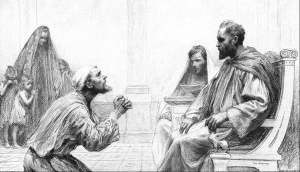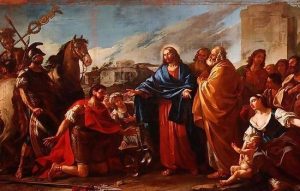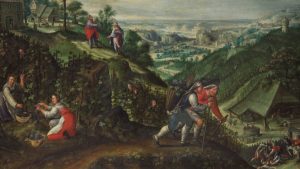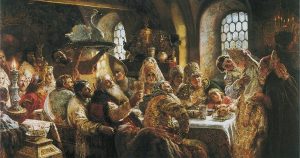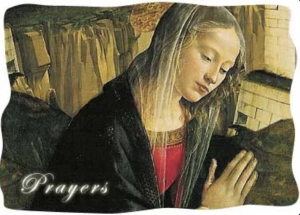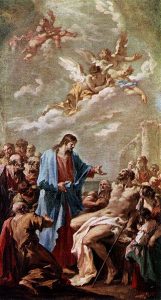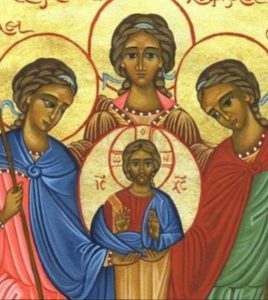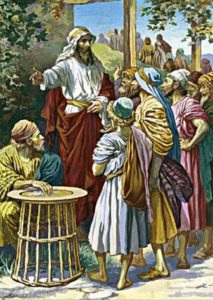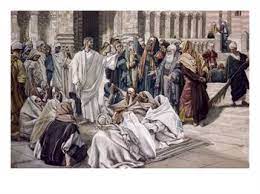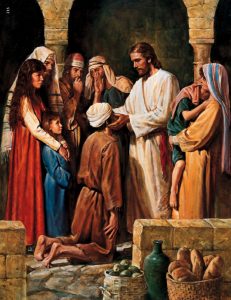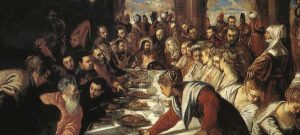We are in the 24th Sunday in Ordinary Time, Year A. Last week we heard from the news that Pope Francis made a historic visit to Mongolia with 1,450 Catholics served by three churches. The Catholic Church was there in the 13th century during the Yuan Dynasty but faded away because the communist regime took power. In 1991, due to the opening of the country to religious missionaries, the missionaries returned to rebuild the church from scratch and established diplomatic relations between the Holy See and Mongolia.
A missionary was interviewed by EWTN TV network saying that, “God precedes before the coming of the missionaries to Mongolia.” By culture they are nomadic people, but just like the time of Abraham, Moses and others who led the chosen people, God accompanies them and manifests His presence with them. This is exactly the same experience of the people of Mongolia; they are not far from encountering God, especially with the recent visit of Pope Francis. There will be enormous growth and harvest for the Church, indeed encouraging and strengthening the mission of the Church to announce the gospel to all corners of the world. We pray for our brethren throughout the world. St. Paul says, “to whom God chose to make known the riches of the glory of this mystery among the Gentiles; it is Christ in you, the hope for the glory.” (Col 1:27)
God has come with us in history and even in our private life. The 1st reading from the Book of Sirach reminds us of a valuable lesson that we must forgive our neighbor’s injustice. Then, when we pray, we feel that we are also forgiven, which is the power of God’s grace given to each one of us.
The 2nd reading today tells us that, “None of us lives for oneself, and no one dies for oneself.” Thus, I cannot imagine that our Christian life is personal, but rather it concerns too our relationship with others, for we all journey together.
Our constant interaction with others can create some friction. It is normal for we have unique personalities. That is where God’s divine command comes in, that is, to remind us to love one another. True loving means being ready to understand and pardon the mistakes of others. We must allow forgiveness to reside in us, and that forgiveness comes from the heart. People find it easy to say, “I forgive you!” but then the person cannot really forgive someone. To overcome our unforgiveness, let us remember that we are all hurt and go through the same path overcoming emotional baggage; however, a relationship that has been broken needs healing by our own humility and love and being willing to take small steps of reconciliation, one step at a time. Let us do it so that we can become a better and compassionate person. It is transforming on our part when we are willing to forgive and forget, not from the mind but from the heart. All our pains and heartaches will be healed, and all other illnesses will soon be amazingly cured.
The gospel today, taken from St. Matthew, is imbued with the genuine face of mercy with the narration about Jesus’ way of responding to Peter’s question, “Lord, if my brother sins against me, how often must I forgive him?” We must imitate God’s way and true identity as written in the responsorial Psalm 103, “The Lord is kind and merciful, slow to anger, and rich in compassion.”
How much do we realize that we are called to be forgiving and to be merciful towards others in relation to the gospel?
First, think about God’s generous attitude towards us, that is providing an avenue for healing and comfort by way of pardoning our sins through healing and redeeming action. When we know that we are forgiven, we must be grateful to God for letting us feel how much we are loved.
Second, we are all second chancers. I know that the forgiven debtor failed to realize and to understand that the king’s attitude to forgive him is his way out to be merciful to the person who owed him as well. However, it did not sink into his heart, so he continued oppressing him with an unforgiving heart. His evil heart never changed him as a person. This should not happen. When we know that the grace of forgiveness is received, we also must be dispensers of that same grace of forgiveness. Never be stingy with the goodness we have received, for it guides us to follow a better path in our life.
Third, Jesus narrates the story considerably harsh, when He tells us the king throws the unforgiving, forgiven debtor into prison until the debt is paid. This is a figurative speech. It means that if we can hardly forgive others’ sins against us, certainly God is going to apply the same measure toward us, or else we would be imprisoned into eternal damnation, the prison of eternal fire where there is no way out for redemption.
In today’s mass, let us open our hearts to the grace of forgiveness and mercy. I believe God is always present to heal our hurts, pains and struggles, especially to accept those who are difficult to be with. The grace of God is so abundant that we cannot set a limit to forgiving.
God bless you.
Fr. Arlon, osa
——————————-
El Dictado del Corazón
Vigesimocuarto Domingo del Tiempo Ordinario, año A
- Eclesiástico 27:30-28:7
- Salmo 103:1-2,3-4,9-10,11-12
- Romanos 14:7-9
- Mateo 18:21-35
Estamos en el vigésimo cuarto domingo del Tiempo Ordinario, Año A. La semana pasada escuchamos la noticia de que el Papa Francisco realizó una visita histórica a Mongolia con 1,450 católicos atendidos por tres iglesias. La Iglesia Católica estuvo allí en el siglo XIII durante la dinastía Yuan, pero se desvaneció cuando el régimen comunista tomó el poder. En 1991, debido a la apertura del país a los misioneros religiosos, los misioneros regresaron para reconstruir la iglesia desde cero y establecieron relaciones diplomáticas entre la Santa Sede y Mongolia.
Uno de los misioneros entrevistados por el canal religioso EWTN dijo: “Dios precede a la llegada de los misioneros a Mongolia”. Aunque por cultura son un pueblo nómada, al igual que en los tiempos de Abraham, Moisés y otros que lideraron el pueblo elegido, Dios los acompaña y manifiesta su presencia con ellos. Fue la misma experiencia del pueblo de Mongolia. No están lejos de encontrar a Dios, especialmente durante la reciente visita del Papa Francisco. Habrá un enorme crecimiento y cosecha para la Iglesia. De hecho, alienta y fortalece la misión de la Iglesia de anunciar el evangelio a todos los rincones del mundo. Oramos por nuestros hermanos en todo el mundo para que continúen con la misión de llevar la palabra de Dios a todos los rincones de la tierra. San Pablo dice: “A quienes Dios escogió para hacer notorias las riquezas de la gloria de este misterio entre los gentiles; es Cristo en nosotros, la esperanza de la gloria. (Col 1:27) Dios ha venido con nosotros en la historia y en nuestra vida privada.
La primera lectura del Libro de Eclesiástico nos recuerda una valiosa lección: debemos perdonar las injusticias de nuestro prójimo. Entonces, cuando oramos y pedimos perdón, nosotros también podemos ser perdonados; que es el poder de la gracia de Dios dada a cada uno de nosotros.
La segunda lectura de hoy nos dice que “Ninguno de nosotros vive para sí mismo y nadie muere para sí mismo”. Por lo tanto, no puedo imaginar que nuestra vida cristiana sea personal, sino que se refiere también a nuestra relación con los demás, porque todos caminamos juntos.
Nuestra interacción constante con los demás crea cierta fricción. Es normal que tengamos personalidades únicas. Entonces, es donde entra en juego el mandato divino de Dios, es decir, recordarnos que nos amemos unos a otros. Amar de verdad significa estar dispuesto a comprender y perdonar los errores de los demás. Debemos permitir que el perdón resida en nosotros, y ese perdón viene del corazón. A la gente le resulta fácil decir: “¡Te perdono!” Sin embargo, la persona no puede perdonar a alguien. Para superar nuestra falta de perdón, recordemos que todos estamos heridos y recorremos el mismo camino, superando el bagaje emocional. Una relación que se ha roto necesita ser curada por nuestra humildad y amor para estar dispuestos a dar pequeños pasos de reconciliación, uno a la vez. Es necesario para que podamos convertirnos en personas mejores y más compasivas. Es transformador de nuestra parte cuando estamos dispuestos a perdonar y olvidar, no desde la mente sino desde el corazón. De esa manera, todos nuestros dolores y angustias serían sanados, así como otras enfermedades sanarían asombrosamente.
El evangelio de hoy, tomado de San Mateo imbuido del rostro genuino de la misericordia con la narración de Jesús respondiendo a la pregunta de Pedro: “Señor, si mi hermano peca contra mí, ¿cuántas veces debo perdonarlo? Debemos imitar el camino y la verdadera identidad de Dios como está escrito en el Salmo responsorial 103: “El Señor es bondadoso y misericordioso, lento para la ira y rico en compasión”.
¿Hasta qué punto nos damos cuenta de nuestro llamado a ser perdonadores y misericordiosos unos con otros en relación con el evangelio?
Primero, piense en la actitud generosa de Dios hacia nosotros. Esto es proporcionar una vía para la curación y el consuelo al perdonar nuestros pecados mediante la acción redentora. Cuando nos damos cuenta de que hemos sido perdonados debemos estar agradecidos a Dios por permitirnos sentir cuánto nos ama.
En segundo lugar, todos somos una segunda oportunidad. Sé que el deudor perdonado no se dio cuenta y no comprendió que la actitud del rey de perdonarlo es su salida para ser misericordioso con la persona que también le debía. Sin embargo, no caló en su corazón, por lo que continuó oprimiéndolo con un corazón implacable. Su malvado corazón nunca le permitió cambiar como persona. No sucederá si sabemos que se recibe la gracia del perdón. También debemos ser dispensadores de esa misma gracia del perdón. Nunca seas tacaño con la bondad que hemos recibido, pues ella nos guía a seguir un mejor camino en nuestras vidas.
En tercer lugar, Jesús narra la historia con mucha dureza. Cuando Jesús nos dice que el rey mete en prisión al deudor que no perdona y que no perdona, hasta que se pague la deuda. Este es un discurso figurado. Significa que si difícilmente podríamos perdonar los pecados de los demás contra nosotros, ciertamente Dios va a aplicar la misma medida a nosotros, o de lo contrario, seríamos aprisionados en la condenación eterna, la prisión del fuego eterno donde no hay salida para la redención.
Misa de hoy, abramos nuestro corazón a la gracia del perdón y la misericordia. Creo que Dios siempre está presente para sanar nuestras heridas, dolores y luchas, especialmente para aceptar a aquellos con quienes es difícil estar. La gracia de Dios es tan abundante que no podemos poner el límite al perdón.
Dios los bendiga.
P. Arlón, osa
